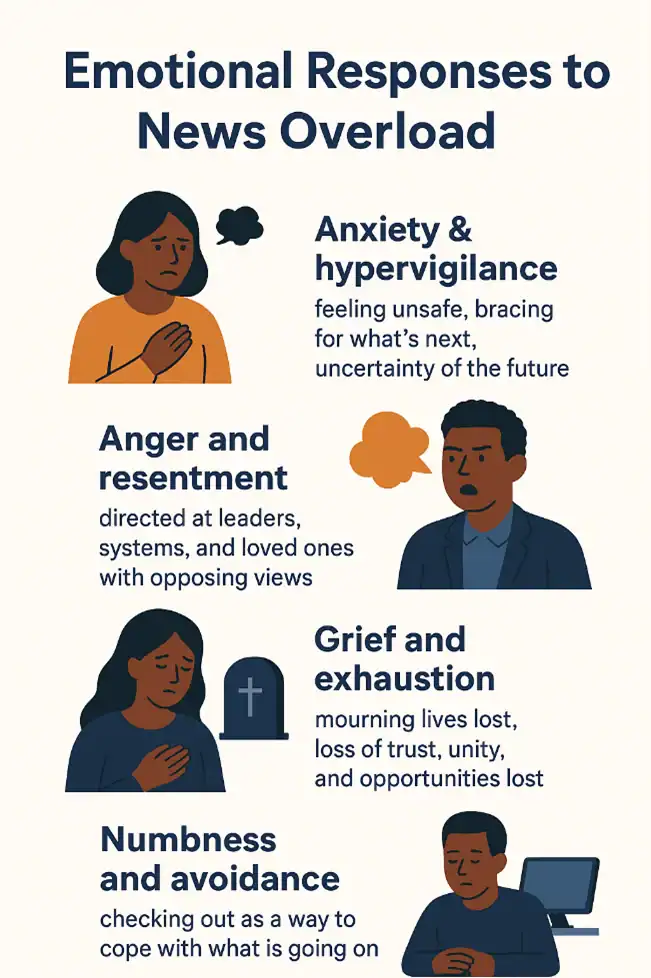By Jennifer Bailey, LCSW & RD
In the last five years, Americans have weathered wave after wave of national and global crises. From the COVID-19 pandemic, the murder of George Floyd, the Capitol attack on Jan. 6, to the dismantling of DEI policies, each event lingers in our feeds. Social media doesn’t let us just witness history, it urges us to relive it, looped and replayed, until the impacts seep in. The result? A nation anxious, hypervigilant, and, more than anything, overwhelmed.
A 2024 Stress in America Poll from the American Psychological Association found that a staggering 77% of Americans see the nation’s future as a major stressor. 72% fear the election could erupt in violence, while more than half see the 2024 presidential race as a possible end of democracy. Political drama has always cast a shadow, but now the intrusion feels personal, as if the entire audience has become the cast in this ongoing tragedy.
The Marathon of Crises
Imagine running a marathon, then surging straight into a triathlon, only to dive into another round. Exhaustion is inevitable. America’s emotional landscape has felt exactly like this, a relentless relay of pandemic, protest, disaster, scandal, and policy crisis. From 2020 to 2025, major events have arrived in rapid succession, draining our psychological reserves.
Recent milestones:
- COVID-19 pandemic and massive wildfires (2020)
- Murder of George Floyd and ensuing protests
U.S. Capitol attack (2021) - Buffalo and Uvalde shootings, Russia’s invasion of Ukraine (2022)
- Increased school shootings, wildfires, global heatwaves, political shakeups, and international conflict have plagued the year 2025.
The finish line always seems to move farther away.
24/7 News and Digital Overload
Gone are the days of the evening news. By 2024, 86% of Americans will get their news digitally. The average adult now checks their phone every few minutes, tallying 144 glances and nearly 4.5 hours of scrolling per day. This isn’t just a stream of headlines. It’s also a tidal wave of opinions, hot takes, and debates, compounding the noise of every crisis.
What starts as one quick clip soon becomes a labyrinth of viewpoints and arguments. The news isn’t just news. It’s news stories, takes about news, and arguments about takes. Each layer adds another emotional weight. The 24/7 news cycle, amplified on social media, fuels anxiety, resentment, and, for some, complete emotional shutdown. The marathon continues, now with searchlights and sirens at every corner.
Choosing Wisely: Protecting Emotional Health
Dane Dalvalantis, licensed clinical professional counselor, offers this perspective: “People have a choice on what media to consume, and it’s okay to protect your peace. When a lot is happening in world affairs and politics, I can understand the pressure people might feel to be informed. At the same time, self-preservation can be necessary.
We are allowed to choose what is best for our own mindset and to keep ourselves regulated. We should be mindful and observe how our media consumption impacts us. As a therapist, I would like to encourage people to be intentional with what they expose themselves to and in how they take care of themselves.”
Finding Balance: How to Manage Emotional Health
- Contributors to emotional overwhelm due to national events are the frequency of events and access to content.
- Viewing one short clip quickly escalates into scrolling through dozens of takes, arguments, and reactions. This results in not just consuming news itself but the infinite layers of commentary around it.
- The consistent and prolonged exposure to the news could increase our experience of negative emotions.
Jennifer Bailey is a wife, mother of three, and therapist. Bailey is a Licensed Clinical Social Worker (LCSW) and Registered Drama Therapist (RDT)




